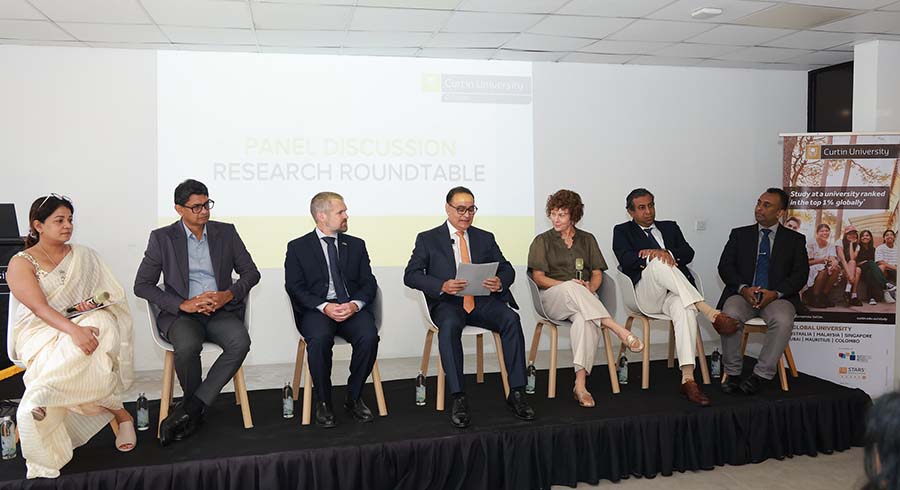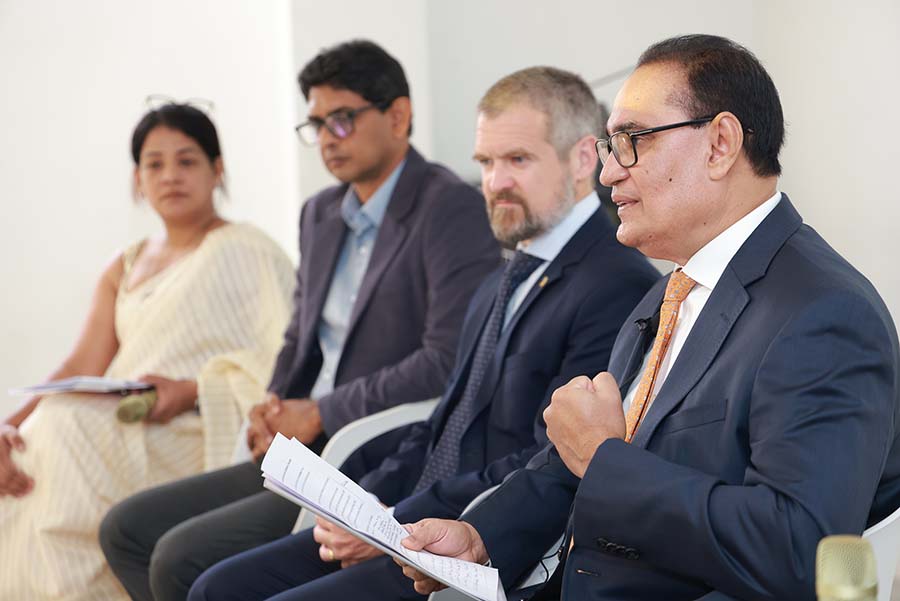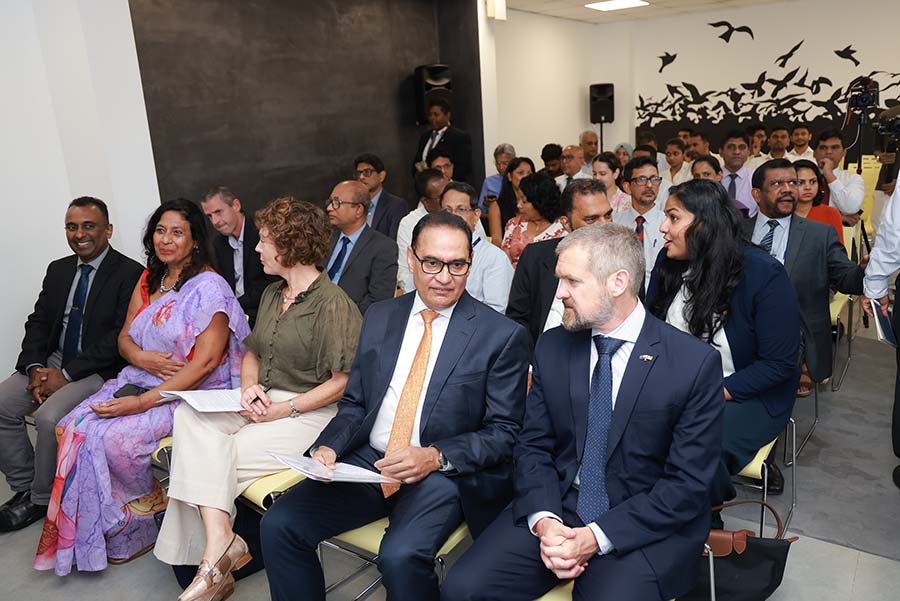In addition, the session was a catalyst for identifying joint initiatives in priority sectors including health, environment, engineering, technology, energy, agriculture, and policy, areas where Australia and Sri Lanka can deliver meaningful impact through shared expertise, innovation, and capacity building.
The structured dialogue included distinguished panellists Australia, High Commissioner to Sri Lanka ,His Excellency, Matthew Duckworth, Prof. Melinda Fitzgerald, Deputy Vice-Chancellor (Research), Curtin University, Prof. Anuji Upekshika Gamage, Chairperson, NRC, Dr. Narendra de Silva, General Manager, Lanka Electricity Company, Mr. Chandima Cooray, Board Member, ICTA and Chief Innovation Officer, HNB and Prof. Chalinda Beneragama, Professor of Agriculture, University of Peradeniya.
The roundtable was moderated by Prof. Lalith Gamage, Chairman & Managing Director, Curtin University Colombo, Vice-Chancellor, SLIIT.
H.E. Mr. Matthew Duckworth emphasised how evidence-based policy will give Sri Lanka more effective, efficient and accountable decisions, better resource allocation, faster translation of research into services, stronger regulation for priority sectors, and greater appeal for international partnerships and funding.
He articulated how diplomatic and development frameworks can catalyse research partnerships and stressed the role of policy alignment in unlocking funding and scaling pilots.
The High Commissioner also called for clearer pathways from research to implementation, urging universities to work closely with government agencies to design projects, meeting regulatory and social needs.
He highlighted Australia’s development cooperation mechanisms and existing research mobility programs can be leveraged to create joint funding streams and facilitate researcher exchanges, accelerating technology transfer and applied pilots.
Prof. Gamage noted, Sri Lanka must prioritise research as a national requirement to generate new knowledge and innovations to solve social and economic problems, inform policy, and improve lives.
He mentioned the Curtin collaboration will support the identification of pathways for joint projects, capacity building, and knowledge exchange to deliver mutual benefits.
Sharing her views, Prof. Melinda Fitzgerald explained Curtin’s engagement in helping Sri Lanka identify shared research priorities, match local experts with Australian partners, and provide seed resources for joint projects and capacity building.
Further, she framed Curtin’s intent to integrate Sri Lanka within the university’s global research agenda by emphasising the strategic value of a Colombo campus as a node for regional applied research and capacity building.
Prof. Fitzgerald highlighted the importance of co-designed projects, targeting high‑impact research in areas, aligning Curtin’s multidisciplinary strengths with Sri Lanka’s development priorities, naming health systems strengthening, climate-resilient infrastructure and digital innovation as immediate priorities.
She argued for institutional partnerships embedding local leadership, shared data platforms and sustained researcher exchanges to provide impact and continuity.
Panelists further elaborated on several practical collaboration proposals. Prof. Anuji Upekshika Gamage urged focus on national research priorities, reconsidering grant architectures, proposing fewer, larger grants targeted at strategic areas to drive scale and measurable outcomes.
Dr. Narendra de Silva identified energy transition pilot projects as an urgent opportunity and proposed applied research partnerships to test grid-integration of renewables, demand-side management and community-level microgrids.
Additionally, Mr. Chandima Cooray emphasised joint work in fintech, AI and digital infrastructure to modernise financial inclusion and support start-up ecosystems through university-industry co-creation.
Prof. Chalinda Beneragama called for collaborative agricultural research to advance climate-resilient crops, precision farming and post-harvest technologies to strengthen food security.
The panel addressed the persistent challenge of technology diffusion.
All speakers acknowledged, generating research is insufficient without deliberate strategies for adoption.
Panellists recommended dedicated research on diffusion mechanisms alongside project funding, stronger industry partnerships for pilot scaling and policy instruments to incentivise adoption in public and private sectors.
The panel agreed embedding knowledge translation specialists within projects and creating demonstrator sites would accelerate uptake.
The Roundtable concluded with a clear mandate to develop concrete project proposals in the coming months, focused on energy pilots, digital innovation for financial and public services, sustainable agriculture trials and joint health systems research.
The event established a pragmatic roadmap for Australia–Sri Lanka research collaboration prioritising impact, capacity building and rapid pathways from research to societal benefit.
Photo Captions
Photo 1 – Seated in the front row (right to left): Prof. Chalinda Benaragama (Professor of Agriculture, University of Peradeniya); Dr. Narendra De Silva (General Manager – LECO); Prof. Melinda Fitzgerald (Deputy Vice-Chancellor (Research), Curtin University Australia); Prof. Lalith Gamage (Chairman & Managing Director, Curtin University Colombo); H.E. Mr. Matthew Duckworth (Australian High Commissioner to Sri Lanka); Mr. Chandima Cooray (Board Member – ICTA and Chief Innovation Officer – HNB); and Prof. Anuji Gamage (Chairperson, National Research Council – NRC).
Photo 2 – Seated in the front row (right to left): Prof. Lalith Gamage (Chairman & Managing Director, Curtin University Colombo); H.E. Mr. Matthew Duckworth (Australian High Commissioner to Sri Lanka); Mr. Chandima Cooray (Board Member – ICTA and Chief Innovation Officer – HNB); and Prof. Anuji Gamage (Chairperson, National Research Council – NRC).
Photo 3 – Seated in the front row (right to left) were H.E. Mr. Matthew Duckworth, Australian High Commissioner to Sri Lanka; Prof. Lalith Gamage, Chairman & Managing Director, Curtin University Colombo; Prof. Melinda Fitzgerald, Deputy Vice-Chancellor (Research), Curtin University Australia; Prof. Mahesha Kapurubandara, Pro Vice-Chancellor – International; and Prof. Chalinda Benaragama, Professor of Agriculture, University of Peradeniya.




